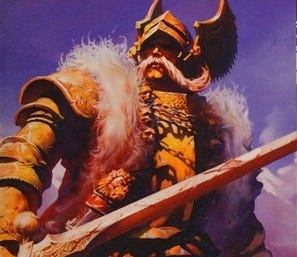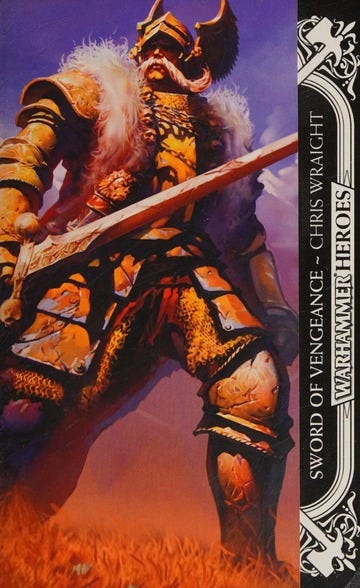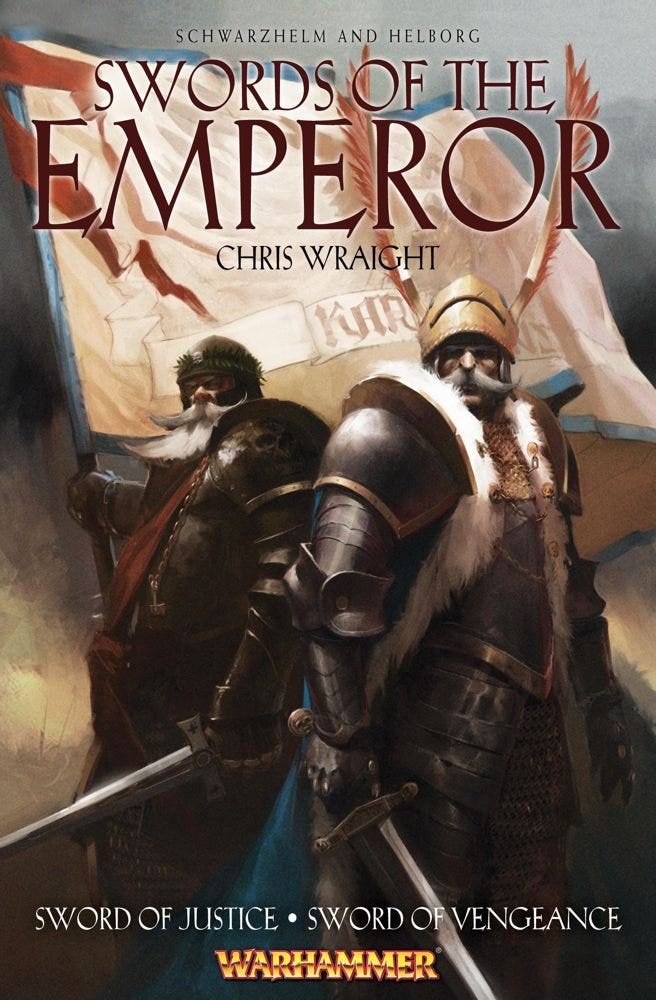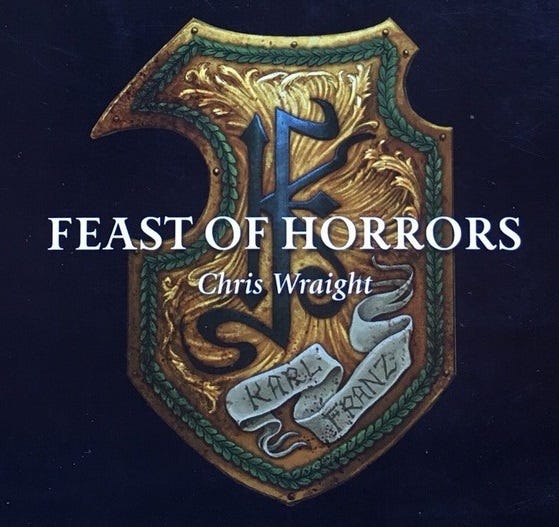Sword of Vengeance by Chris Wraight - A Warhammer Novel Review
The overlong duology about the Empire's two greatest champions ironically fails to really highlight either of them.
Sword of Vengeance by Christ Wraight
Published in 2011
Warhammer Heroes: Sword of Vengeance forms the second part of the Swords of the Emperor duology, taking place immediately after the events of Sword of Justice. After Ludwig’s less-than-ideal handling of Averland’s succession crisis, the city is left in chaos. Some of the greatest heroes of the Empire muster to put an end to it, though past failures hamper all of them — none more so than recovering, believed-dead Emperor’s champion Kurt Helborg.
Despite Sword of Vengeance’s branding as a Kurt Helborg story, fans of the character (myself among them) will probably be disappointed. He spends most of the first half hidden away and tending to his wounds after the events of Sword of Justice’s climax. Don’t expect any new insights or nuances for the character, who takes a backseat to Ludwig and Volkmar.
The latter ends up being the most interesting member of a crowded cast, receiving a meaningful exploration of his strengths and flaws. Having returned from the dead during the (soon to be retconned) events of Storm of Chaos, the once-indomitable leader of the Cult of Sigmar questions how much he lost during his resurrection. We gain new perspectives on his zeal that are novel but not out of character, something the duology doesn’t manage for its protagonists, Ludwig and Kurt.
Admittedly, I find it hard to peg anyone as the main character of Sword of Vengeance, which bounces around every corner of Averland to resolve an elaborate Chaos conspiracy. It’s a complex sequence of events, but not particularly intelligent, relying on the heroes consistently making bad choices. Even the smarter moments wear thin as the story trudges along.
Other Warhammer books sport a similar shifting focus, but Sword of Vengeance is too scattered. And while Wraight struggled to humanize the characters in Sword of Justice, the problem is much more pronounced here. This could have worked, but too much of the page count focuses on advancing the plot, often in questionable ways, like the dubiously relevant Orc subplot.
The length of the book works against itself, and so does Wraight’s blunt writing style. Aside from a few characterful moments and interesting images in the Chaos plotline, it all feels a bit too clinical and doesn’t leave enough to the imagination. The horrific experiments and strange architecture lose their impact when they show up so frequently and receive immediate explanations, lost in the minutiae of the villains’ elaborate scheme. Wraight’s writing style still works with the action sequences, both the heroic duels and monumental clashes, but none of them are particularly memorable.
A broader issue is a tone so cynical that it feels more at home in the hopeless future of Warhammer 40,000. I appreciate an Empire that isn’t written as clear-cut heroic, but Wraight gives us no one to root for.
The Empire’s leaders alternate between greedy incompetents and blundering strongmen who despise their subjects. That can work on its own, but Wraight exclusively writes the regular citizens of the Empire as lowly, ignorant, and unable to fend for themselves. Between that, an unearned redemption, and some flirting with chosen one tropes, you get a morose, flat vision of the Empire that’s strangely sympathetic to the leaders it condemns.
It’s hard to imagine any eccentric but heroic playwrights or poets-turned-outlaws living in the desperate lands shown in Sword of Vengeance. The Empire’s humanity and capacity for improvement are what make the faction work for me, and this book instead opts for a less-advanced, more gunpowder reliant version of Warhammer 40K’s Imperium.
The duology tries to weave a major story, featuring setting-relevant cities threatened with destruction, the Empire’s biggest names, and even a major retcon for Elector Count Marius Leitdorf’s apparent insanity. But for all the grand setpieces and occasional strong dialogue, the prose and events of the story don’t measure up to the scale or pomp.
Nastassia, the mastermind behind all these events and the only major female character in either book, is a cookie-cutter Slaanesh-aligned villain. She isn’t quite hammy enough to be played straight, and her humanizing moments come too little and too late. On top of the continued absence of female characters, sexual assault comes up frequently in Sword of Vengeance, and the sensitive subject is treated as set dressing most of the time. The Leitdorf plotline specifically is some of the worst handling of it I’ve seen in a Warhammer book.
That’s all to say, the promising elements of the Swords of the Emperor duology are swept away early on into Sword of Vengeance. It wraps up competently and functionally, but there’s a certain spark missing, one desperately needed to justify such a long, winding, and mean-spirited tale.
Of note are the two short stories included in the collected editions, also written by Chris Wraight. Feast of Horrors is a fun romp where Schwarzhelm uncovers the Warhammer equivalent of Hansel & Gretel, with a good mix of campy horror and somberness. Duty and Honour pits Kurt Helborg against the archaic, Arthurian-esque warriors of Bretonnia, whose honorable ways clash with Helborg’s underhanded pragmatism.
Both only clock at 15 pages each, but they end up feeling far more satisfying and memorable than the duology itself. Wraight’s punchy writing style benefits from the short length and narrower perspective. More importantly, Ludwig and Kurt get proper chances to shine, both as legendary warriors and mortal men burdened by their lofty offices.
I only wish that Swords of the Emperor followed suit.
Besides the initial paperback, Sword of Vengeance received a slipcover duology release with the first book. There was also a paperback omnibus edition, Swords of the Emperor. A more recent Warhammer Chronicles omnibus was also published under the title Heroes of the Empire.
Swords of Vengeance and its non-Chronicles omnibus are easy to find in print around MSRP or below, and a digital edition of the Chronicles omnibus is available through Black Library.








